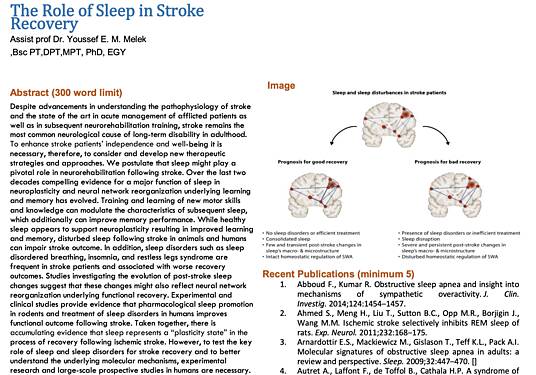The Role of Sleep in Stroke Recovery
Case description
Despite advancements in understanding the pathophysiology of stroke and the state of the art in acute management of afflicted patients as well as in subsequent neurorehabilitation training, stroke remains the most common neurological cause of long-term disability in adulthood. To enhance stroke patients’ independence and well-being it is necessary, therefore, to consider and develop new therapeutic strategies and approaches. We postulate that sleep might play a pivotal role in neurorehabilitation following stroke. Over the last two decades compelling evidence for a major function of sleep in neuroplasticity and neural network reorganization underlying learning and memory has evolved. Training and learning of new motor skills and knowledge can modulate the characteristics of subsequent sleep, which additionally can improve memory performance. While healthy sleep appears to support neuroplasticity resulting in improved learning and memory, disturbed sleep following stroke in animals and humans can impair stroke outcome. In addition, sleep disorders such as sleep disordered breathing, insomnia, and restless legs syndrome are frequent in stroke patients and associated with worse recovery outcomes. Studies investigating the evolution of post-stroke sleep changes suggest that these changes might also reflect neural network reorganization underlying functional recovery. Experimental and clinical studies provide evidence that pharmacological sleep promotion in rodents and treatment of sleep disorders in humans improvesfunctional outcome following stroke. Taken together, there is accumulating evidence that sleep represents a “plasticity state” in the process of recovery following ischemic stroke. However, to test the key role of sleep and sleep disorders for stroke recovery and to better understand the underlying molecular mechanisms, experimental research and large-scale prospective studies in humans are necessary. The effects of hospital conditions, such as adjusting light conditions according to the patients’ sleep-wake rhythms, or sleep promoting drugs and non-invasive brain stimulation to promote neuronal plasticity and recovery following stroke requires further investigation. Quality sleep has many benefits, especially for stroke survivors. Getting a good night's sleep supports neuroplasticity, the brain's ability to restructure and create new neural connections in healthy parts of the brain, allowing stroke survivors to re-learn movements and functions. People who got less than 7 hours of shuteye or 8–9 hours had no higher risk of stroke than those who slept 7–8 hours. Importantly, people who both slept for longer than 9 hours and napped for more than 90 minutes per day had an 85% higher risk of stroke than those who slept and napped moderately.
Other documents of this user
Christmas Disease
Dr. Youssef Edwar Mounir Melek
views: 516
Youssef's Concept
Dr. Youssef Edwar Mounir Melek
views: 1016
Recommended
Charcot - Marie Tooth Disease
Armando Hasudungan
views: 447











